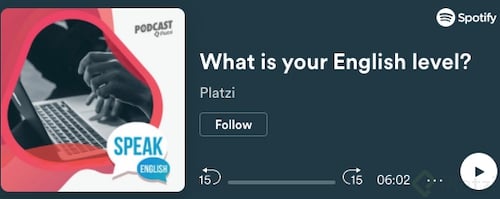Si no lo sabes, pero sientes que entiendes el inglés, quiero invitarte a que escuches nuestro podcast, Speak English.
Algo que me gusta mucho de los podcasts es que los puedes escuchar mientras lavas los platos, arreglas tu cama o tu cuarto, en fin, mientras haces otras cosas 😃
Y escuchar es el primer paso para aprender un idioma.
Grabamos un episodio sobre los niveles de inglés y aquí te comparto la transcripción de ese episodio para que lo escuches y lo leas al mismo tiempo.
Si te preguntas: “como saber qué nivel de inglés tengo”, toma nuestro test de nivel. Es gratuito y podrás evaluar todas las habilidades: https://platzi.com/evaluation/test-ingles/ 🚀
Y a continuación te dejo el dialogo.
Carol: Hello and welcome to Platzi’s Speak English podcast. I am Carol and I am a Course Director in the Professional Growth Faculty in Platzi.
Jess: Hello everyone, I am Jess Harris, and I am an English Training lead at Platzi.
Carol: Do you want to know what is your English level? We will talk about this topic in this episode.
Jess: To begin we will review some vocabulary we will use in this podcast.
Carol: Terms: words or phrases used to describe a thing or express a concept.
Jess: Exchange (the noun): means giving something and receiving something of the same kind in return.
Carol: Idioms: a phrase or expression whose meaning can’t be understood from the ordinary meaning of the words included in it. For example: The test was a piece of cake. This means it was easy.
Jess: That’s very important, idioms are hard to understand so it’s good to look up the definition.
The next one is advantages: circumstances that put one in a favourable position.
Carol: And disadvantages: unfavourable circumstances that reduce the chances of success.
For example, if you need to go to an office to work, living close to work is an advantage and living far from your office could be a disadvantage.
Jess: Exactly, now we have a trivia question for you: Which English level is the minimum required in most job opportunities? Stay tuned to find out the answer.
Carol: Now let’s get into the topic. The Common European Framework of Reference for Languages defines levels based on the expression, oral and written comprehension of languages such as English. There are 3 blocks and 6 levels.
Jess: Basic users can be: A1 or A2
If your level is A1:
You can introduce yourself and ask others about their personal details.
You are able to understand and use simple expressions and very basic phrases.
And you might be able to interact with someone that speaks English slowly and clearly.
Carol: Is your level A2?
Then you understand common expresions and sentences and you are able to communicate with others and exchange information about routine tasks as well as describing aspects about your life and immediate needs.
Jess: Independent users can be B1 or B2
If your level is B1
You understand familiar topics related to education, work, traveling and much more.
You are able to write about things that you are interested in or with which you are familiar.
Conversations in English are more fluent so you can describe situations, goals, or give your opinion and feel more comfortable when interacting with native speakers
Carol: Let’s move on to B2:
If you are in this level you understand more complex topics in English including technical terms in the work place.
You can have conversations with native speakers fluently at a faster pace.
You can write about various topics clearly and explain advantages and disadvatages.
Jess: Proficient users have a C1 or C2 level
With a C1 level you can perform complex education and work-related tasks and you understand difficult long texts.
You can use more idioms and expressions freely when having informal conversations.
You can also write text about complex topics with a good and clear structure.
Carol: If you if find yourself in the C2 level:
You understand everything you read or hear in English.
You express yourself freely in both informal and formal situations.
And you can summarize information from different sources, both written and spoken, as well as construct arguments.
It’s very hard to reach a C2 level. Usually if you have a C2 level you are a native speaker.
Jess: Yes, that’s very true. Most people stop at C1 and that’s a very sufficient level for learning a language.
Now let’s answer the trivia question: Which English level is the minimum required in most job opportunities?
Carol: And the answer is B2!
Jess: Wow B2! And Carol can you remind me, what can you do at a B2 level?
Carol: If you are in a B2 level you understand more complex topics in English including technical terms, you can also have conversations with native speakers fluently and you can write about different topics clearly.
Jess: In our course Strategies to learn English Online, which is the first course in the English School, you will find a placement test to know what your level of English is.
Carol: Even if you get a high score on the test I highly recommend to complete all our pronunciation courses and participate in our monthly activities to practice your English speaking skills. Go to platzi.com/english to find out more.
Jess: Every week we have a free class for you, to watch it go to platzi.com/speak.
Carol: Thank you for listening!
Jess: Till next time!
Cuéntame, ¿qué te pareció el episodio? ¿Lograste entender todo el podcast?
Si estás en el comienzo de tu camino de aprendizaje, posiblemente estés en el nivel A1 en inglés. Este es el primer nivel, el de principiantes, y podrás mejorarlo con los cursos de nuestra escuela de inglés.
Tenemos un episodio nuevo de Speak English todos los viernes por la noche. ¿Hay algún tema del cuál te gustaría que habláramos?
Thank you for listening and for reading this blogpost. 💚
Curso para Entrevistas de Trabajo en Inglés (2020)
COMPARTE ESTE ARTÍCULO Y MUESTRA LO QUE APRENDISTE












